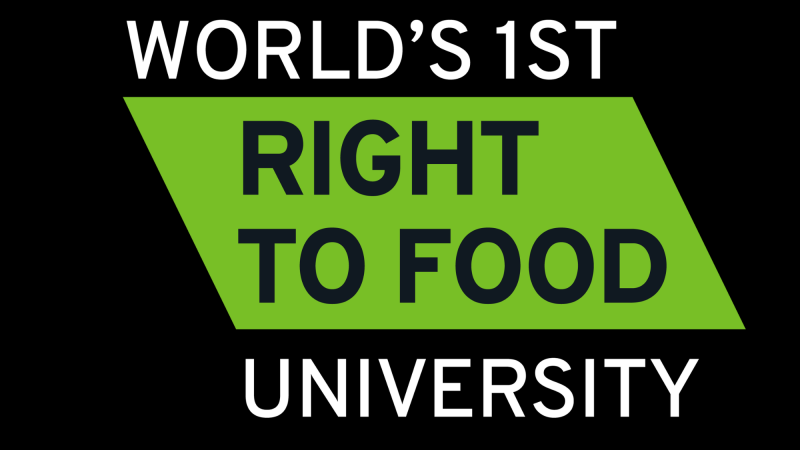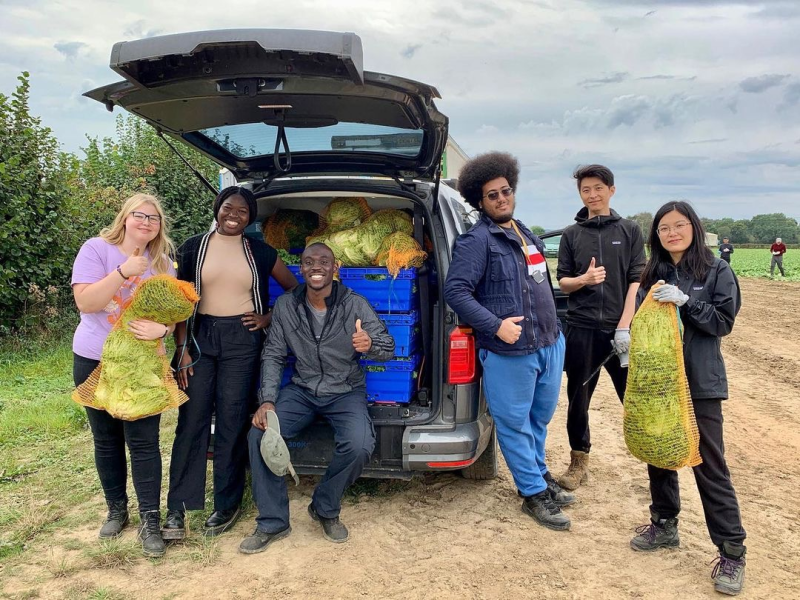
Rapheal Mutu, Gleaning co-ordinator
In Kent as in the rest of the UK, surplus fresh produce is left in the field post-harvest or not harvested due to staff, quality or price constraints. Nationally, pre-farm gate food waste has been estimated to be 1.6 million tonnes annually.
Gleaning is the process of picking this surplus food and veg from farms that would otherwise go to waste, and redistributing it to those who need it. Raphael, an International student from Nigeria, is the Produced in Kent Gleaning Co-Ordinator for the University of Kent, organising weekly gleans at a network of registered farms in the area and utilising student volunteers to collect the produce and redistribute it.
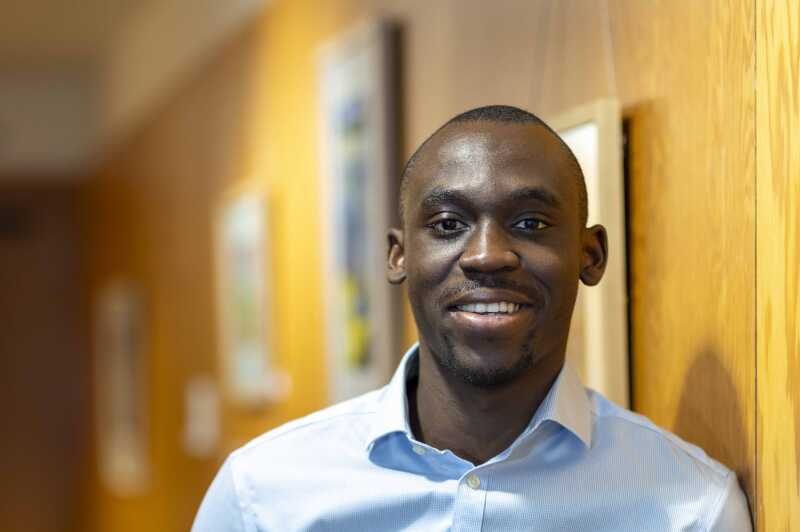
'Every living individual on earth partakes in the consumption of food and so this sector is very significant and yet it seems that at times it is completely ignored. My aim is to change this by encouraging more people in my generation to bring innovation and youthful zeal to the sector.
'Gleaning is a terminology that I was already familiar with but I was surprised to here that it was still taking place in modern day England. I saw an opportunity to actively and charitably strive towards sustainability. In 2023 this can be considered as ‘gold dust’.
'I initially was just going to register to become a volunteer but when I heard of the opportunity to be the coordinator, I jumped at it because, I knew that being the gleaning coordinator would expose me to new knowledge and experiences in the sector that I would not get elsewhere. It was a once in a lifetime opportunity and I wasn’t going to let it slip through my hands.’
'I am always hungry to learn and understand more about the complexities of the sector. The FruitFocus event highlighted that the sector had a talent shortage as most young people don’t even consider agriculture or horticulture related jobs when making career plans. This has made me even more eager to compel more students to embark on gleaning - I believe the experience will open their eyes to a wonderful sector that they often shun.”
Raphael’s aim is to get more family members and friends signed up to gleaning.
'I appreciate that everyone is very busy in this sector and that is why we are only asking that people dedicate 4 hours a month to gleaning. The more gleaners we have on board with they project the food we can get to those who need it most.'
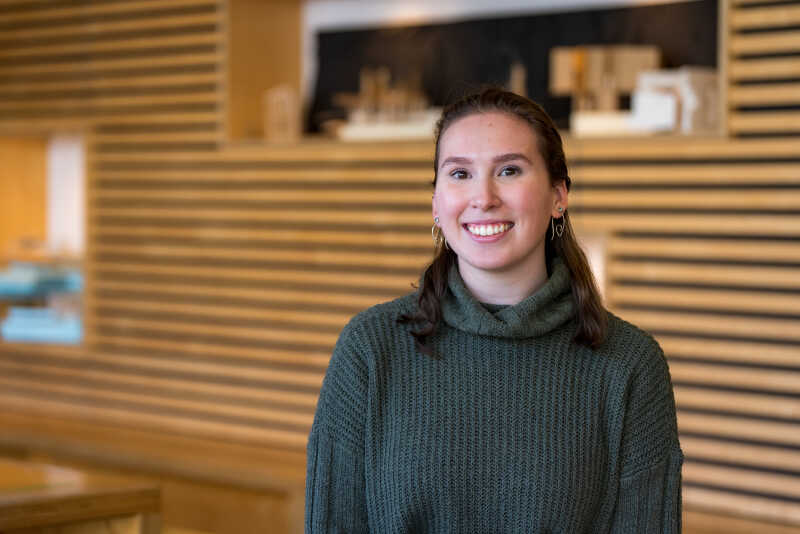
Zoe Symonds and Mackenie Barrall both M-Arch (2 years) students and taking their food modules
Zoe is a mature student, ex locations manager, and having completed several small-scale renovations with her husband ‘got the bug’ and decided to study for a 3 year UG in architecture and has continued with this M-Arch.
Mackenzie, is an International student from the U.S. who studied for her four-year UG in Arch in Rome. She decided to study for her M-Arch in Canterbury because her interest is in the sustainability of historic buildings.
First project was ‘live’ i.e working collaboratively in a team of 5 with a local charity Canterbury Food Bank, based in a vast warehouse off The Thanet Way. They worked with the food bank team to create an ‘architectural intervention’ -so, come up with a design scheme that improved their service and the day to day running of an initiative that takes in food donations from supermarkets and distributes them to families across Kent. They provided 127,000 meals over one year to struggling people in Kent. Zoe and Mackenzie are both clearly really inspired by working on one aspect of nourishment in the county.
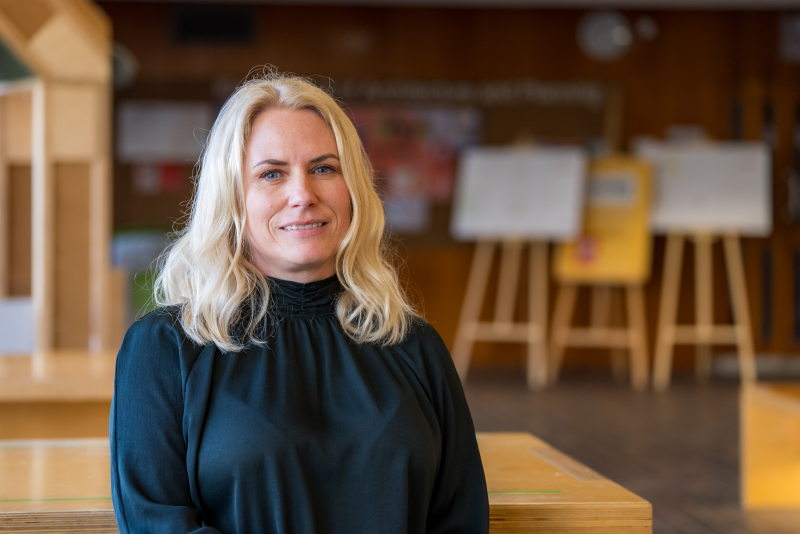
Charlie and Ameria, Kent Community Oasis Garden Ambassadors
Charlie and Ameira help mentor students, host events and promote the garden on social media, all with the aim to make the space as welcoming and friendly as possible.
“KentCOG is a partnership project between the University of Kent and East Kent Mind, a mental health charity. It’s a lovely space for students, staff, and community members to learn and practice sustainable gardening, and socialise.
We thrive to create a space that’s open and respectful of everyone, and also the natural habitats and biodiversity on site. We want this space to not only be about gardening but also about connecting and enjoying yourself with nature.
Even in winter, there’s always things to do in the garden, both outside and inside. There’s usually plants to care for, bulb planting, maintenance to do around the garden (weeding, bark chipping, dead hedging, etc) arts and crafts activities, and we start planting seeds in February.
As student ambassadors, we aim to participate in making this space welcoming for our fellow students, as well as work on social media outreach and represent the student volunteers in management meetings. We want to make sure each student feels safe and heard at the garden!”
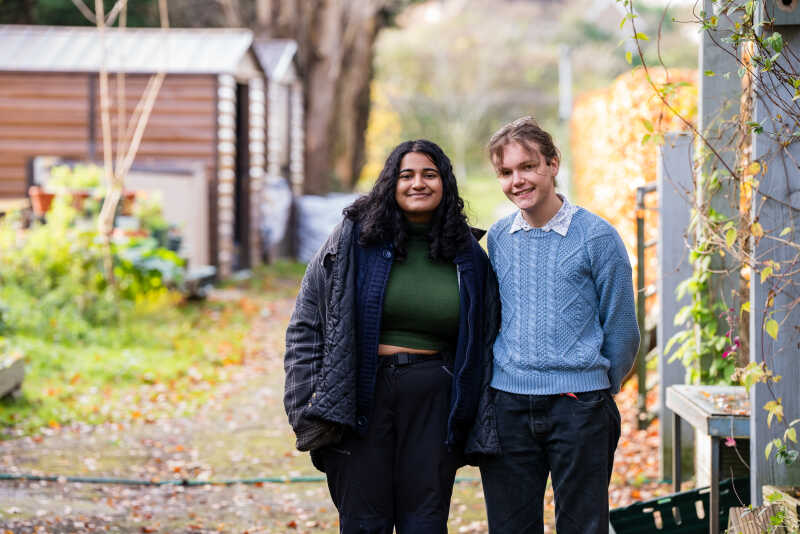
Their current project about Future Food has to involve a scheme of their own choosing within Canterbury.
Mackenzie’s idea is inspired by her own life and the lifestyle and eating habits of a students. She lives alone and mapped out her own eating habits over a week and collected images of what her friends were batch cooking to eat. Her design is a food swapping system (a bit like Amazon lockers) where you swap your bulk made meals with someone else’s that you fancy.
Zoe’s design is inspired by climate change using the prediction of future flood plains and the advantages this increase water can bring to farm. Inspired by the Aztecs who grew on water, she has designed a series of barge type allotments on the River Stour that would be grown by students and then communally cooked for student food. Centred around St Raddigan’s car park with a proposed boat shed there to cook in. Also looking at using the sea to farm.
The Kent Community Oasis Garden is located near the end of Park Wood at our Canterbury campus. KentCOG is open on Wednesdays and Fridays 10:00-14:00. Students, staff and the local community are invited to attend these open gardening sessions, no experience necessary.
Jack Scott, Environmental Social Sciences student and farmer
“My first acre began when the land manager over at Quex Park had a hedge fill of brown tail caterpillars which destroyed the hedge. He said to me, you can have it and grow veg on it or we’ll plough it back into the field and that’s how I began my veg growing journey at 12/13 years old.”
Now, the winner of BBC's Countryfile 2023 Young Countryside Champion Jack singlehandedly grows 25 types of vegetables -with the occasional help from his dad!
The degree informs the business through sustainability. So it's looking at sustainable factors that we can implement into our business.
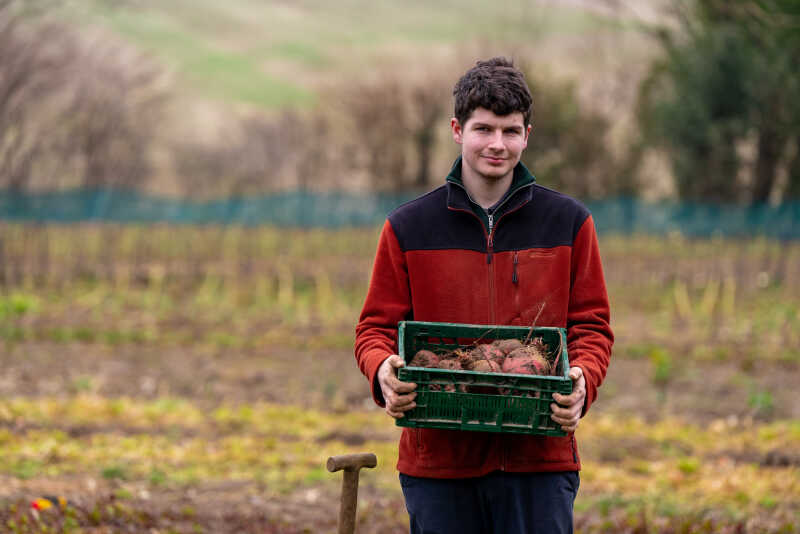
Alongside running his own horticultural business and hedge and wood planting, Jack works closely with his supply chains and customers. Renting land at Nonington Farms, he runs educational visits for those aged between 5 and 25 years old to experience agriculture and learn more about farming.
In 2024, Jack will be working with The Perfect Place to Grow initiative, a cafe and training kitchen in Margate, Kent, designed to help 18 to 24-year-olds in Thanet into future employment. A cohort of young trainees will spend a number of days a week working with Jack on the farm, with the remainder of the week cooking dishes in the kitchen for the public using products from their week with the supplier.
Jack is also an Assistant Conservation Advisor at Farming and Wildlife Advisory Group South East.
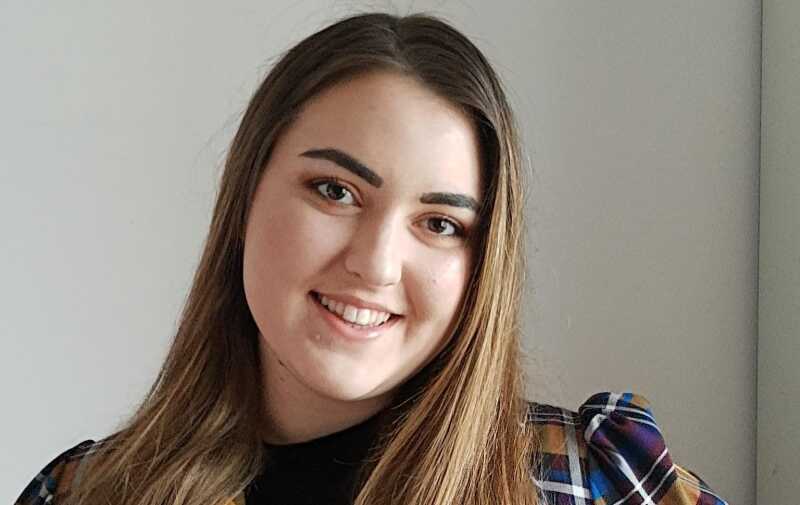
Ally Kirtley, Phd in Economics
For her PhD Ally is working on working on an agri-environmental research project in Ghana with Trade4SD, looking into the sustainability of the cocoa value chain. The initiative is based around the concept that trade policy has an important part to play in achieving the UN Sustainable Development Goals (SDGs).
SDGs/ Sustainable objectives include education and therefore in order for a new sustainable farming incentive to do well, an entire community have to be educated enough to understand and support it. Ally is measuring the impact of an educational intervention in a community of cocoa producers in Northern Ghana. She made a visit there this summer with her two supervisors Alastair Bailey and Sophia Davidova.
“My research focuses on measuring the sustainability preferences of cocoa farmers in rural communities of Ghana.
After many interviews with research partners at the University of Ghana who will help with the data collection on the ground, we identified the appropriate Sustainable Development Goal to focus on: Education. In Ghana, education is becoming more accessible as it is provided freely by the Government until secondary school level. However, the funds for books and education supplies are non-existent and require intervention.
The hope from this study is to identify whether communities are willing to invest into the education of the children in their community using a game that I have designed and a survey to understand their choices. Once we have identified these more “education oriented” communities, we were hoping to leave an impactful legacy from the survey by donating education supplies and books in these communities that we survey.
We are currently working with an NGO Rural Literacy Solutions based in Northern Ghana to expand their reach to rural communities into the Eastern Region of Ghana to raise money to provide books and education training to the teachers in the villages that we survey for my research.”





